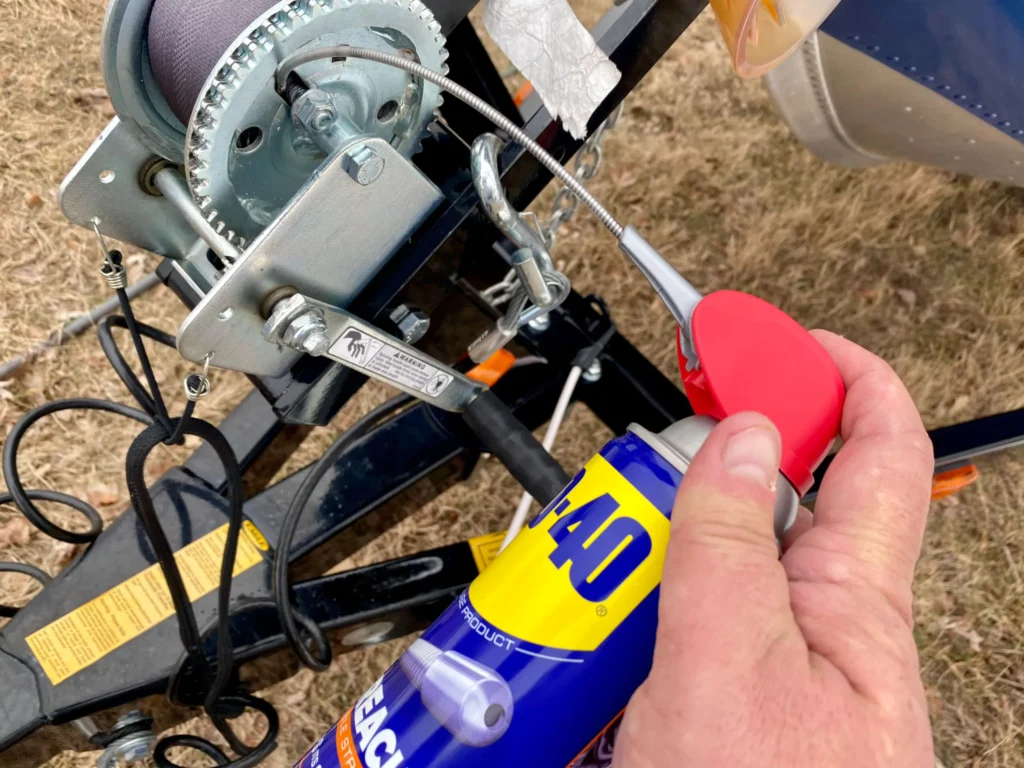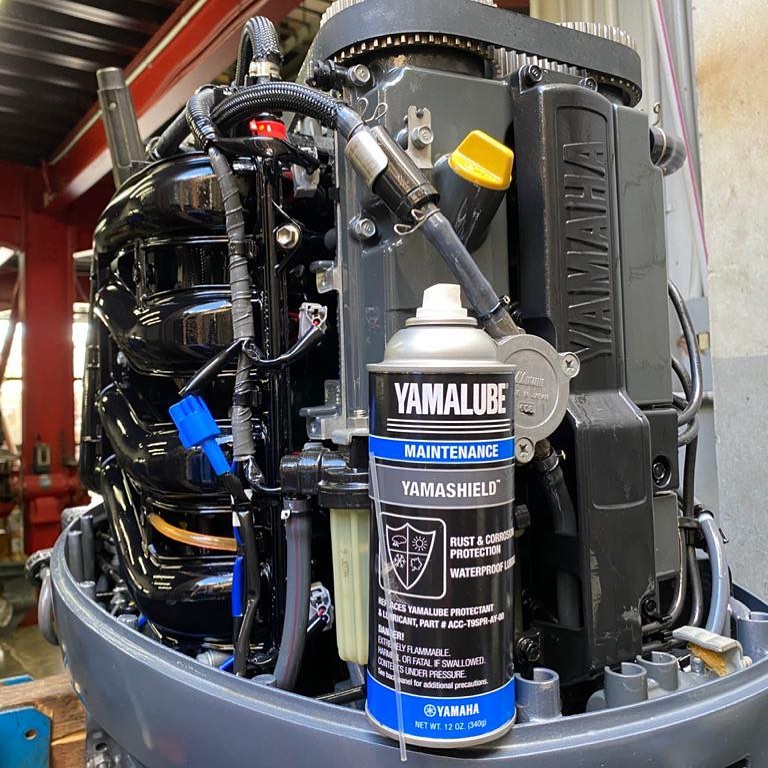When it comes to maintaining a boat, every seasoned boater has their go-to products for lubrication and corrosion protection. Two of the most commonly mentioned names in this space are WD-40 and Yamalube Marine Spray Protectant, but they serve very different purposes. While WD-40 has a reputation as an all-purpose lubricant and rust preventer, it is not the best choice for marine applications—especially when it comes to protecting engines and electrical components in a saltwater environment.
A product like Yamalube Marine Spray Protectant is designed specifically for marine use, offering long-term corrosion resistance, lubrication, and water-repelling properties. Understanding the key differences between these two products is crucial to ensuring that your boat’s engine and components are properly protected from the harsh effects of saltwater and humidity.

WD-40: What It Is and Why It Falls Short in Marine Applications
WD-40 has been around since the 1950s, originally developed as a water-displacing formula (hence the “WD” in its name) to prevent rust on aerospace components. It’s a mixture of solvents, a light lubricant, and corrosion inhibitors designed to loosen rusted parts, displace moisture, and provide short-term protection against oxidation. It’s a versatile product with a wide range of household and automotive applications, but it was never meant to be a long-term marine-grade solution.
One of the biggest misconceptions about WD-40 is that it’s a strong lubricant. While it does provide some lubrication, it’s a thin oil that evaporates quickly, leaving behind minimal lasting protection. This makes it less than ideal for marine engines, moving components, and electrical connections that need long-term lubrication and corrosion resistance.
Additionally, WD-40 can attract dirt and debris, forming a sticky residue over time. In a marine environment, this is a major issue, as salt, moisture, and grime can quickly accumulate on engine components, increasing the risk of corrosion and mechanical failure.

Yamalube Marine Spray Protectant: Engineered for Marine Environments
Unlike WD-40, Yamalube Marine Spray Protectant is designed specifically for use in saltwater and freshwater conditions. It goes beyond just displacing water—it seals and protects metal surfaces, preventing oxidation and providing long-term corrosion resistance. The formulation contains dedicated anti-corrosion agents and high-quality lubricants that remain in place, rather than evaporating like WD-40.
One of the biggest advantages of Yamalube’s marine-specific formula is that it creates a protective barrier against salt and moisture, which is essential for preventing rust and deterioration on outboard engines, throttle linkages, and electrical components. Unlike WD-40, it won’t break down rubber seals, plastic connectors, or wire insulation, making it safe to use on battery terminals, wiring harnesses, and ignition systems.
Marine engines are constantly exposed to humidity, salt spray, and extreme temperature fluctuations, all of which accelerate corrosion. A product like Yamalube Marine Spray Protectant is engineered to combat these conditions, ensuring that critical engine components remain functional and protected for the long haul.
Breaking Down the Key Differences
To better understand why WD-40 isn’t the best option for marine use, let’s compare these two products in key areas:
1. Corrosion Protection
WD-40 offers temporary corrosion resistance but evaporates quickly, leaving metal components exposed after a short period. Yamalube Marine Spray Protectant, however, is designed to form a long-lasting protective layer, making it the better choice for saltwater environments where constant exposure to moisture and oxidation is a concern.
2. Lubrication and Wear Prevention
While WD-40 provides some lubrication, it is very light and short-lived, making it ineffective for engine components that require long-term wear protection. Yamalube is formulated with marine-grade lubricants that stay in place, reducing friction and wear on throttle cables, linkages, and mechanical parts.
3. Moisture Resistance
WD-40 is great at displacing water, but it doesn’t provide a lasting barrier against future moisture exposure. Yamalube, on the other hand, not only repels water but also prevents future corrosion by sealing surfaces and keeping them dry. This is critical for marine electrical systems, where saltwater intrusion can cause corrosion and failure.
4. Effect on Plastics, Rubber, and Electrical Components
One of the biggest downsides of WD-40 is that its solvent-based formula can degrade rubber seals, plastic components, and wiring insulation over time. This can lead to premature wear, cracking, and even electrical failures. Yamalube is formulated to be safe on marine-grade rubber and plastic components, making it the better choice for protecting wiring harnesses, connectors, and battery terminals.
5. Residue and Buildup
WD-40 tends to leave behind a sticky film that can attract dust, dirt, and salt. Over time, this buildup can actually accelerate corrosion rather than prevent it. Yamalube repels grime and moisture, keeping components clean and protected.
When Should You Use Each Product?
While WD-40 has some uses on a boat, it should not be used as a primary marine protectant. Here’s when it makes sense to use each product:
✔ Use WD-40 for:
• Loosening stuck or rusted bolts
• Removing adhesive residue or stubborn grime
• Temporarily displacing water from electrical connections in an emergency
✔ Use Yamalube Marine Spray Protectant for:
• Protecting outboard and inboard engines from corrosion
• Lubricating throttle linkages, shift cables, and mechanical parts
• Sealing and protecting electrical connections, battery terminals, and ignition systems
• Preventing saltwater corrosion on exposed metal surfaces
Final Verdict: Choose the Right Product for the Job
While WD-40 is a well-known and useful product, it is not designed for marine applications, especially when it comes to long-term engine and corrosion protection. It works well as a quick fix for loosening stuck parts or displacing moisture in emergency situations, but it evaporates quickly, attracts grime, and can degrade rubber and plastics over time.
If you want lasting protection for your boat’s engine, electrical system, and metal components, a marine-grade protectant like Yamalube Marine Spray Protectant is the superior choice. It offers long-term corrosion resistance, lubrication, and moisture protection, making it the best option for anyone serious about preserving their boat’s performance and longevity.
Investing in the right products now can save you costly repairs and downtime in the future. Protect your boat the right way—skip the WD-40 for engine protection and go with a dedicated marine spray protectant.

